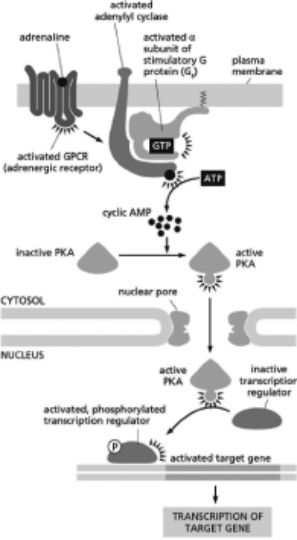You are interested in how cyclic-AMP-dependent protein kinase A (PKA) functions to affect learning and memory, and you decide to study its function in the brain.It is known that, in the cells you are studying, PKA works via a signal transduction pathway like the one depicted in Figure 16-15.Furthermore, it is also known that activated PKA phosphorylates the transcriptional regulator called Nerd that then activates transcription of the gene Brainy.Which situation described below will lead to an increase in Brainy transcription?  Figure 16-15
Figure 16-15
Definitions:
Brain
The brain is the organ located in the head of an organism that coordinates its behavior and mental processes, including thought, emotion, and memory.
Association Cortex
Sometimes called association areas, the region of the cerebral cortex that is the site of the highest intellectual functions, such as thinking and problem solving.
Intellectual Functions
Cognitive capabilities related to reasoning, problem-solving, planning, abstract thinking, comprehension, and learning.
Cerebral Cortex
The outermost layer of the brain, involved in high-level functions such as sensation, voluntary muscle movement, thought, reasoning, and memory.
Q3: Cadherins<br>A)are used to transfer proteins from one
Q8: A single nondisjunction event during meiosis<br>A)will block
Q12: In which document did the U.S.Congress gave
Q18: The oxygen-dependent reactions required for cellular respiration
Q26: Explain how the diffusion of ubiquinone in
Q50: In anaerobic conditions, skeletal muscle produces<br>A)lactate and
Q53: Enhancers can act over long stretches of
Q55: You discover that the underlying cause of
Q60: Which of the following is NOT a
Q70: Glycolysis generates more stored energy than it